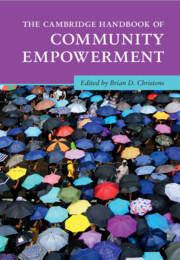Book contents
- The Cambridge Handbook of Community Empowerment
- Cambridge Handbooks in Psychology
- The Cambridge Handbook of Community Empowerment
- Copyright page
- Contents
- Figures
- Tables
- Contributors
- Building Community Power
- Part I Organizing and Activism
- Part II Participatory Governance
- Part III Civil Society and Coalitions
- 11 Community Leadership Development
- 12 Community Coalitions and Empowerment
- 13 Youth-Infused Community Coalitions
- 14 Neighborhood Associations and Community Change
- 15 State-Led Community (Dis)empowerment in China
- Part IV Enterprise
- Part V Participatory and Community Arts
- Part VI Education and Engaged Research
- Contributor Details
- Index
- References
11 - Community Leadership Development
from Part III - Civil Society and Coalitions
Published online by Cambridge University Press: 18 April 2024
- The Cambridge Handbook of Community Empowerment
- Cambridge Handbooks in Psychology
- The Cambridge Handbook of Community Empowerment
- Copyright page
- Contents
- Figures
- Tables
- Contributors
- Building Community Power
- Part I Organizing and Activism
- Part II Participatory Governance
- Part III Civil Society and Coalitions
- 11 Community Leadership Development
- 12 Community Coalitions and Empowerment
- 13 Youth-Infused Community Coalitions
- 14 Neighborhood Associations and Community Change
- 15 State-Led Community (Dis)empowerment in China
- Part IV Enterprise
- Part V Participatory and Community Arts
- Part VI Education and Engaged Research
- Contributor Details
- Index
- References
Summary
Rising poverty, shrinking economic opportunities, disengaged citizens and contentious public discourse, and racial inequality have become some of the greatest challenges communities are confronting. In efforts to maximize participation in addressing these issues, universities, community organizations, corporations, local government entities, and foundations are, independently or collaboratively, devoting resources to develop local leadership capacities. This chapter examines these community leadership development efforts and details two cooperative extension programs in a Midwestern US state. Through analysis of these case examples, the chapter offers a vision for how to reimagine community leadership programs so that they are more responsive to the complexity of current and emergent community challenges. An argument is made that US university extension services, because of their strong ties to local communities and networks nationwide, are well placed to support community leadership development that promotes community-identified strategies to address a wide range of local issues among diverse stakeholders. Insights from this chapter can inform future research and influence the design and implementation of community leadership development programs around the world.
Keywords
- Type
- Chapter
- Information
- The Cambridge Handbook of Community Empowerment , pp. 289 - 312Publisher: Cambridge University PressPrint publication year: 2024

